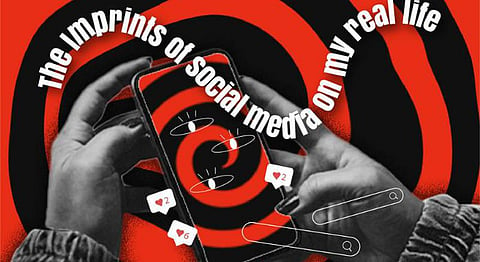
- HOMEGROWN WORLD
- #HGCREATORS
- #HGEXPLORE
- #HGVOICES
- #HGSHOP
- CAREERS
- ABOUT US
- CONTACT US

I am 24 and I feel like I’ve spent a larger part of my adult life on the internet. I am what they call a ‘heavy internet user’ basically meaning that I spend over 14 hours a week on the internet, chances are you are too. My screen time is further proof of my compulsive need to engage with social media platforms; on average, I spend over 30 hours a week scrolling my feed almost mindlessly.
I don’t know when and how social media became such a big part of my life. My 30 hours average is a result of making a conscious effort to spend lesser time on the internet and on most days I just watch reel after reel hoping for some sort of distraction from my daily life.
Back in 2019, I witnessed Hanif Kureshi’s immersive art piece Surfing, where a giant room was filled with styrofoam balls. Regardless of how long you stay in the room, you would walk out with the small white balls stuck to your clothing. In a follow-up conversation, he said it’s like the internet, once you enter it you can’t leave without its remnants.
Growing up in the internet generation, where most of my teenage years were dictated by a sudden rise in the social media phenomenon, I think about how social media has changed. Back in 2011, when most of my friends started joining platforms like Facebook and Instagram we just uploaded random fun things; writing nonsense on each other’s feeds and posting saturated sepia-toned pictures of almost anything and everything.
Now, every feed is curated, it’s considered a form of self-expression, of what you wish to endorse, every post and story a way to figure out who you support, what ideology you believe in and whether you’re on the right side of things. But more than I am on the internet, I think to myself, “When did every notification ping become an opportunity to know the world more, to stay updated and relevant but also know less of myself; less of my own limitations and of my own convoluted sense of empathy?”
As Jia Tolentino, author of Trick Mirror says in her essay The I in The Internet, “Where we had once been free to be ourselves online, we were now chained to ourselves online, and this made us self-conscious. Platforms that promised connection began inducing mass alienation.”
Despite the fact that social media has been linked to inducing a sense of anxiety and depression, affecting our sense of worth and making us constantly feel an overwhelming burden of staying updated, we keep coming back for more. Even after the white dude-bros of Silicon Valley have claimed in The Social Dilemma that the algorithm is programmed to polarise us and pushes out content on the basis of whoever is paying more in ad revenues, we find ourselves almost every day on the internet; scrolling and doomscrolling.
I can’t help but think of author Patricia Lockwood’s rat analogy in her novel No One Is Talking About This, she says, “The people who lived in the portal were often compared to those legendary experiment rats who kept hitting a button over and over to get a pellet. But at least the rats were getting a pellet, or the hope of a pellet, or the memory of a pellet. When we hit the button, all we were getting was to be more of a rat.”
Comparing the internet to a portal, she talks about how every time we enter this portal we put on a performance and represent a brand. The internet is where ‘you’ are essentially the brand.
I spend endless hours on the internet, sometimes doomscrolling, sometimes mindlessly scrolling on Linkedin seemingly growing frustrated as to how everyone seems to be achieving so much more than I can ever imagine. Then there’s the Instagram scrolling where everyone always seems to be on vacation or having their lives sorted and so put together with their perfect bodies and their perfect group of friends. I find myself chasing an aesthetic, trying to fit myself into a unidimensional internet model.
To fight my need to chase an aesthetic, I decide to post whatever I want but this is still very much an aesthetic. If you’re on the internet a lot like me, you start realising you’re on it even when you’re not. The trappings of it seem inescapable. We very much live in a world created by the internet and our attention is what fuels it.
On most days I find myself opening Instagram out of muscle memory. I open it mindlessly; distracted and mid-conversation with friends, without realising I’m on it already. As soon as someone asks me something I don’t particularly know of, I find myself googling the answer. The internet is everywhere and as they say, everything stays forever on the internet. But where does the internet end and I begin?
(Full Disclosure: Contrary to what it may seem, the writer of this article loves the internet and the sense of freedom and joy its early days offered.)
If you enjoyed this piece we recommend you check out:
